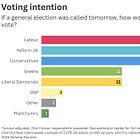New data: the golden opportunity for Nigel Farage and Reform
Some brand new data tells us a lot about what's coming
Matt Goodwin’s newsletter goes to a community of 77,700 subscribers from 181 countries. Like our stuff? Then for the equivalent of buying us a pint each month become a paying supporter. Help us make a difference while gaining access to everything —the full archive, exclusive weekly posts, events, discounts, comments and most of all know you’re supporting independent writers who are challenging the broken status-quo and giving voice to the Forgotten Majority. You can also join us on YouTube, Instagram, TikTok, Twitter/X and Facebook.
Everywhere you look in Europe at the moment elites are struggling or simply failing to contain national populists. In Germany, after the Alternative for Germany (AfD) was blocked from joining a governing coalition, despite finishing second at recent elections, the party just topped a national poll for the first time —a huge watershed.
In France, too, after the establishment banned Marine Le Pen from standing at the next presidential election, in 2027, her protégé, Jordan Bardella, just topped the latest polls, reflecting how, as I suggested, the use of lawfire to try and suppress national populism will inevitably backfire on an increasingly remote and insular elite.
In Austria, Sweden, Italy, the Netherlands and elsewhere, similar parties are also either governing or doing well in the polls, reflecting how, as I’ve long argued, the national populist rebellion will only get stronger so long as the ruling class refuses to address people’s legitimate concerns over mass immigration and broken borders.
And it’s the same here in Britain where, despite the recent dispute between Nigel Farage and Rupert Lowe, Reform is still riding high.
In the latest polls, Reform is averaging 25% of the national vote —more than ten points higher than what they polled at the general election less than a year ago. In fact, Reform has been top or joint top in four of the last six polls.
It’s the most popular party among men, has captured one in five Tory voters, nearly half of the Brexit vote and is now, by far, the most popular party among the working-class, a point Farage leaned into this week by campaigning to save the steel industry.
But look closely at some brand new polling and you’ll find a more specific and really important opportunity opening up for Reform —and one that is still underestimated and downplayed by much of the political and media class in Westminster.
So, drawing on this brand new polling, as well as our own detailed analysis of the most favourable seats for Reform, here is that golden opportunity —and why I think it’s going to become a major story in British politics over the next five years.
This is an exclusive post for our paid subscribers who make our work possible and in return can access everything, including the full archive, discounts, events, the debate, and more.
Keep reading with a 7-day free trial
Subscribe to Matt Goodwin to keep reading this post and get 7 days of free access to the full post archives.



